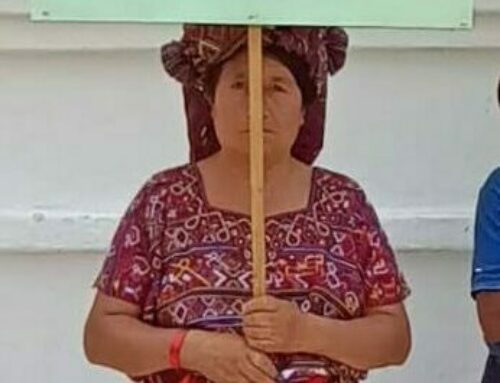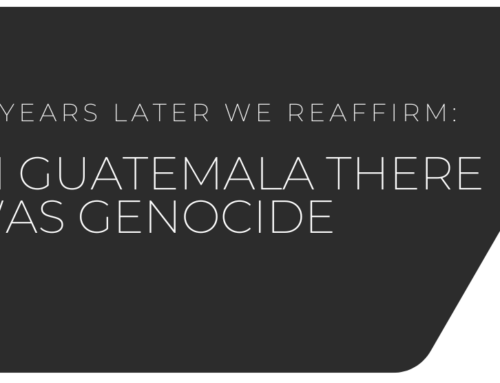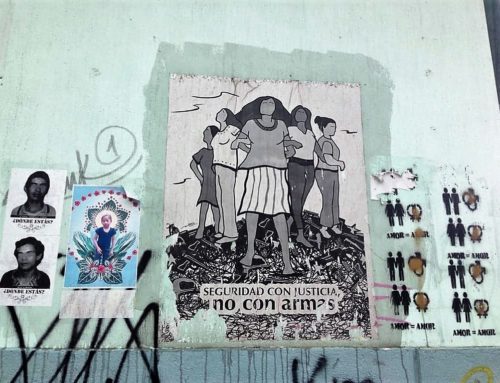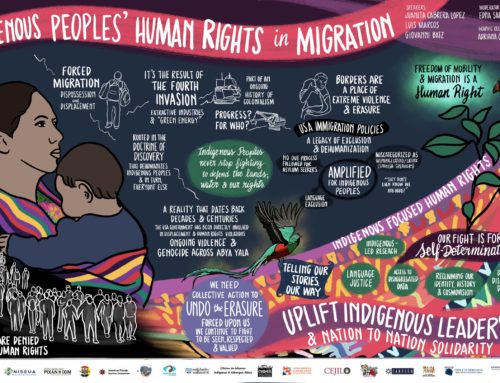Project Description
ACTIVE: Ask your Congresspeople – What’s DHS Doing in Guatemala?
UPDATE: Since this action, the U.S. has continued to promote immigration imperialism in Guatemala through human rights-violating measures such as the third safe country agreement. Read more here.
Communities and organizations in Huehuetenango have expressed concern and outrage at the U.S. government’s attempt to militarize Guatemala’s northern border in a purported attempt to curb migration and human trafficking.
Communities first encountered a sudden increase in U.S. and Guatemalan military presence in Huehuetenango and Ixcán due to a joint military exercise at the end of May. The exercise was carried out under the pretext of providing superficial assistance on engineering, construction, and health care projects. Then, at the end of May, the U.S. Department of Homeland Security (DHS)’s Interim Secretary Kevin McAleenan visited Guatemala and signed a Memorandum of Cooperation with Guatemala’s Interior Ministry, Enrique Degenhart. Many Guatemalans consider Degenhart to be one of the state’s most entrenched promoters of corruption, corporate abuse, and police militarization.
In the Memorandum, DHS agreed to send U.S. federal agents to Guatemala’s border regions to increase security and intelligence cooperation between the U.S. and Guatemala. McAleenan also met with corporate actors in Guatemala City and went to San Mateo Ixtatán in Huehuetenango to profess support for a “peace and development” plan linked to Energía y Renovación S.A. The company has been tied to the murders of several anti-dam activists in Ixquisis, as well as militarization and a long series of human rights abuses.
Once again, the U.S. government threatens communities’ safety and self-determination, as well as their territorial integrity through an extractivist model of development, imposed through militarization.
Communities and organizations in Huehuetenango consider this a violation of the Peace Accords, an invasion, and a threat against their security and well-being.
In light of U.S. government attempts to limit migration through militarization and extractivism, we call on members of our network to call their Congresspeople, inform them of the situation, and ask them:
-
With U.S. troops already present in “humanitarian” activities in northern Guatemala and with a Memorandum of Cooperation signed between DHS and the Guatemalan Interior Ministry, Guatemalan communities want to know: with whom have U.S. security forces spoken about their presence? Have they consulted with the legitimate authorities representing the nine Indigenous peoples represented in the territories?
-
How many U.S. federal agents is the government planning to send to Guatemala, in what capacity, and for how long? What agencies will they be from and who are they working with in Guatemala? How are U.S. agents vetting those Guatemalan agencies to ensure they’re not involved in human rights violations, corruption, and crime?
-
Did DHS negotiate this Memorandum of Cooperation directly with the Guatemalan government, rather than going through the State Department? If they negotiated it outside of the usual channels, how will we guarantee oversight of their actions?
-
Will DHS work with its own personnel or will it use private contractors? If it will use contractors, how can we ensure oversight of their actions?
-
Apart from intelligence and security agents, will the U.S. government send troops to militarize the northern Guatemalan border and/or pressure Mexico to further militarize its own border, essentially moving the U.S.’s border policies further south?
-
Given the failure of European companies to impose hydroelectric projects in these territories, do American companies plan on pushing those projects forward, with the support of the U.S. government as part of an extractivist “development” model?
-
Given that extractive projects, accompanied by state security forces, have caused extreme violence in the region and have forcibly displaced local populations, why does the U.S. government think that more militarization and more extractivism will lower the local population’s need to migrate?
-
This year, the Trump administration and the U.S. Embassy have remained largely silent as Guatemalan politicians and oligarchs seek to insulate themselves from punishment for corruption and impunity. There was little reaction in the face of attacks against the CICIG, demonstrating tacit support for corruption. If corruption is one of the driving factors of migration, how can the U.S. government justify its silence in the face of these corrupt actors? Worse still, why does the proposed solution seek to increase cooperation with and further empower those same actors through more “public-private collaboration?”
Call your Congresspeople today and let us know what their responses are!





